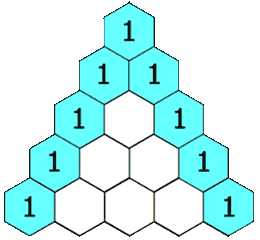Given an integer rowIndex, return the rowIndexth (0-indexed) row of the Pascal's triangle.
In Pascal's triangle, each number is the sum of the two numbers directly above it as shown:
Example 1:
Input: rowIndex = 3 Output: [1,3,3,1]
Example 2:
Input: rowIndex = 0 Output: [1]
Example 3:
Input: rowIndex = 1 Output: [1,1]
Constraints:
0 <= rowIndex <= 33
Follow up: Could you optimize your algorithm to use only O(rowIndex) extra space?
class Solution:
def getRow(self, rowIndex: int) -> List[int]:
row = [1] * (rowIndex + 1)
for i in range(2, rowIndex + 1):
for j in range(i - 1, 0, -1):
row[j] += row[j - 1]
return rowclass Solution {
public List<Integer> getRow(int rowIndex) {
List<Integer> row = new ArrayList<>();
for (int i = 0; i < rowIndex + 1; ++i) {
row.add(1);
}
for (int i = 2; i < rowIndex + 1; ++i) {
for (int j = i - 1; j > 0; --j) {
row.set(j, row.get(j) + row.get(j - 1));
}
}
return row;
}
}function getRow(rowIndex: number): number[] {
let ans = new Array(rowIndex + 1).fill(1);
for (let i = 2; i < rowIndex + 1; ++i) {
for (let j = i -1; j > 0; --j) {
ans[j] += ans[j - 1];
}
}
return ans;
};class Solution {
public:
vector<int> getRow(int rowIndex) {
vector<int> row(rowIndex + 1, 1);
for (int i = 2; i < rowIndex + 1; ++i) {
for (int j = i - 1; j > 0; --j) {
row[j] += row[j - 1];
}
}
return row;
}
};func getRow(rowIndex int) []int {
row := make([]int, rowIndex+1)
row[0] = 1
for i := 1; i <= rowIndex; i++ {
for j := i; j > 0; j-- {
row[j] += row[j-1]
}
}
return row
}
